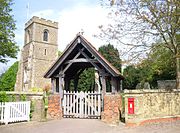Norton, Hertfordshire
| Norton | |
|---|---|
 Church of St Nicholas in Norton |
|
| District | |
| Shire county | |
| Region | |
| Country | England |
| Sovereign state | United Kingdom |
| Post town | LETCHWORTH GARDEN CITY |
| Postcode district | SG6 |
| Dialling code | 01462 |
| Police | Hertfordshire |
| Fire | Hertfordshire |
| Ambulance | East of England |
| EU Parliament | East of England |
| UK Parliament | |
Norton is a small village in Hertfordshire, one of the three original villages which were absorbed into Letchworth Garden City, the other two being Willian and Old Letchworth. The village is known to have existed by 1007, with remains of the medieval settlement visible as earthworks in a field beside the church. However, the history of the village goes back even further than that.
Archaeological excavations in Norton have revealed evidence of human activity in the area going back to before around 3000 BC. People lived at different sites in the village during the Neolithic, Bronze and Iron Age, with continuity into the Roman period. Anglo-Saxon occupation is evident from a small cemetery discovered at Blackhorse Road in 1957 and a settlement discovered at Kristiansand Way in 1989, thought to be the lost site of Rodenhanger. It was during this latter period that the first written evidence about Norton appeared. A charter relating to Norton dating from AD 1007 is the earliest document to survive, recording its donation to the Abbey of St Albans and claiming that it had originally been given by Offa, King of Mercia, in the eighth century, together with Rodenhanger, a lost site said to lie together with Norton. The manor appeared in the Domesday Book of 1086, when it was listed among the lands belonging to the Abbots of St Albans. The records of the manorial courts, which date from AD 1244, give an extensive overview of the life of Norton's villagers during the medieval period. Following the Dissolution of St Albans Abbey in 1539 the manor of Norton passed into private hands, but its manorial courts continued to record the activities of its villagers until 1916.
...
Wikipedia
